A snapshot of stories from around Europe
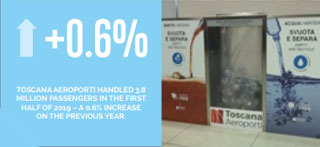
Florence and Pisa airports
Florence and Pisa will be among the first European airports to become 100% plastic free. 150kg of plastic are collected every day and over 3,000 litres of bottled drinking water are wasted. Aware of this, Toscana Aeroporti has presented an initiative that ranks among the first in the airport sector: transforming Florence and Pisa into 100% Plastic Free airports and engaging them in the recovery of water resources. The Toscana Aeroporti project will be developed in three macro-phases: Phase 1 Recovery and Recycling, Phase 2 Stop Plastic, Phase 3 100% Plastic Free. The main actions include: installation of bins to collect water and other liquids at the security checkpoints, installation of drinking water fountains landside and airside and, eventually, an airport-wide ban on the sale and use of plastics.
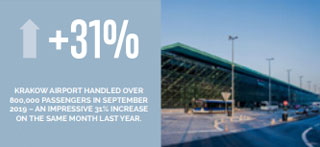
Krakow Airport
Krakow Airport has appointed London-based design specialists The Design Solution (TDS) to transform the commercial spaces in its terminal. Over the past decade the airport has been one of the fastest-growing regional airports in Europe and has developed an ambitious Master Plan for its long-term development. The blueprint for the future includes the expansion of the terminal building and apron, repositioning of the cargo facility and the construction of a new runway. The airport, which expects to handle close to eight million passengers this year, has chosen PIG Architekci Sp. z o.o. to spearhead the terminal expansion project’s design team. TDS will carry out the commercial planning for the new-look terminal. All works are due for completion in 2026.
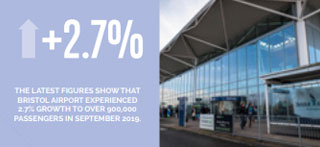
Bristol Airport
Bristol Airport has now switched to a 100% renewable electricity supply in a bid to draw closer to achieving carbon neutrality by 2025. Electricity is the largest contributor to carbon emissions from on-site airport operations and the three-year agreement with global renewable energy supplier, Ørsted, will see the airport’s annual electricity use of 17 million kWh powered entirely by renewable sources. What’s more, a growing number of aircraft stands are equipped with Fixed Electrical Ground Power (FEGP), reducing the need to use diesel powered engines for essential pre-flight services. Over the duration of the contract an estimated 14,000 tonnes of carbon will be saved across the airport site as a result of the move to renewables – equivalent to the emissions from driving 34m miles in an average car.
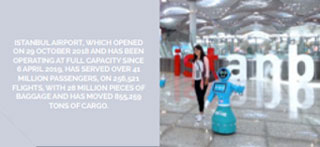
Istanbul Airport
Istanbul’s new massive airport is receiving a helping hand from “humanoid” wheeled robots introduced to assist passengers in navigating the structure. Mini ADA, the robot with artificial intelligence developed by Akinrobotics, Turkey’s domestic robotics brand, has been launched at the country’s new hub. Four robots that express themselves through their arms and on-screen faces are now hard at work guiding passengers around Istanbul Airport’s 1.4-million-square-metre terminal. Passengers will be able to approach the robots and scan their tickets to see their flight status, get directions and view other flight information in English or Turkish.
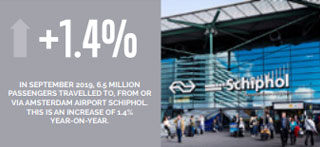
Amsterdam Airport Schiphol
Amsterdam Airport Schiphol has completed the roll-out of its own network for Internet of Things applications. The network offers coverage in all public areas, and thanks to its greater range and reduced power consumption, compared to wi-fi, it is ideally suited to connecting with smart sensors and sending data over long distances. The sensors connect facilities and infrastructure at Schiphol to the internet, while the information from these sensors provides the airport with real-time insights. The first Internet of Things application at Schiphol involves the option for passengers to share real-time feedback regarding their experiences of the toilet facilities. Over 550,000 responses were received in September 2019. The real-time information enables the airport’s cleaning contractors to take proactive action to remedy malfunctions or untidy conditions.

Manchester Airport
Manchester Airport is to introduce a home bag check-in and delivery service for passengers in partnership with Airportr. The fully integrated baggage service allows passengers to have their luggage collected straight from their home prior to the date of their departure, meaning they can travel to the airport bagfree, head straight for security, and reunite with their bags in baggage reclaim at their final destination. The service will be available to passengers travelling with partner airlines which include Virgin Atlantic, easyJet, British Airways, American Airlines, Cathay Pacific and Finnair. The new system creates a ‘win-win’ scenario, where the passenger experience is enhanced with a convenient at-home service, while also unlocking operational efficiencies for Manchester Airports Group by reducing the amount of baggage processed in the terminal.
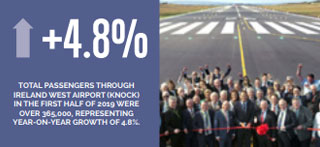
Knock-Ireland West Airport
Ireland West Airport (Knock) has officially opened its new runway following a €11 million refurbishment designed and project managed by Atkins, a member of the SNC-Lavalin Group. The 2,400m runway – which is the third longest in the country – handles all flights at Ireland West Airport and is central to the airport’s vision to attract one million passengers per year. This is the first time in its 34-year history that the runway has had a full overlay, including taxiways, and an upgrade of the instrumentation landing systems. The four-month refurbishment works took place overnight during non-operational hours to minimise disruption and enable the airport to function normally during the day.
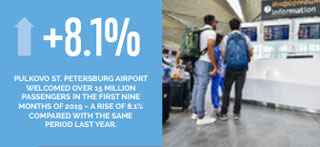
Pulkovo St. Petersburg Airport
Starting October 1, 2019, Pulkovo St. Petersburg Airport will serve tourists from 53 countries entering the Russian Federation with free electronic visas. St. Petersburg Airport took all the necessary technical and organisational measures. The equipment of the border control facilities passed the testing. Travellers heading to the cultural capital of Russia for tourist, business or humanitarian reasons can apply online for a free visa. The application can be made no later than 4 and no earlier than 20 days before the expected date of entry. Visitors will be able to stay in Russia for 8 days out of the 30-day validity period. Application for electronic visas is available on the information portal of the Ministry of Foreign Affairs of the Russian Federation, starting October 1, 2019.







